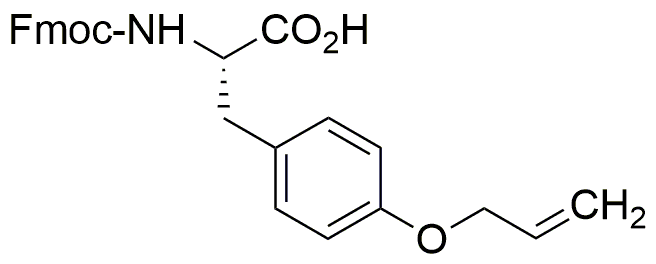Fmoc-O-allyl-L-tyrosine is widely utilized in research focused on:
- Peptide Synthesis: This compound serves as a key building block in the synthesis of peptides, allowing for the incorporation of unique functionalities that enhance the properties of the final product.
- Drug Development: It plays a crucial role in the development of novel pharmaceuticals, particularly in designing compounds that target specific biological pathways, improving efficacy and selectivity.
- Bioconjugation: Researchers use it for bioconjugation processes, linking biomolecules to create targeted drug delivery systems, which can improve therapeutic outcomes.
- Research in Neuroscience: Its derivatives are explored in neuroscience research for studying receptor interactions and signaling pathways, contributing to the understanding of neurological disorders.
- Material Science: The compound is also applied in the development of smart materials, where its unique chemical properties can be utilized to create responsive systems for various applications.
General Information
Properties
Safety and Regulations
Applications
Fmoc-O-allyl-L-tyrosine is widely utilized in research focused on:
- Peptide Synthesis: This compound serves as a key building block in the synthesis of peptides, allowing for the incorporation of unique functionalities that enhance the properties of the final product.
- Drug Development: It plays a crucial role in the development of novel pharmaceuticals, particularly in designing compounds that target specific biological pathways, improving efficacy and selectivity.
- Bioconjugation: Researchers use it for bioconjugation processes, linking biomolecules to create targeted drug delivery systems, which can improve therapeutic outcomes.
- Research in Neuroscience: Its derivatives are explored in neuroscience research for studying receptor interactions and signaling pathways, contributing to the understanding of neurological disorders.
- Material Science: The compound is also applied in the development of smart materials, where its unique chemical properties can be utilized to create responsive systems for various applications.
Documents
Safety Data Sheets (SDS)
The SDS provides comprehensive safety information on handling, storage, and disposal of the product.
Product Specification (PS)
The PS provides a comprehensive breakdown of the product’s properties, including chemical composition, physical state, purity, and storage requirements. It also details acceptable quality ranges and the product's intended applications.
Certificates of Analysis (COA)
Search for Certificates of Analysis (COA) by entering the products Lot Number. Lot and Batch Numbers can be found on a product’s label following the words ‘Lot’ or ‘Batch’.
Numéro de catalogue
Numéro de lot/série
Certificates Of Origin (COO)
This COO confirms the country where the product was manufactured, and also details the materials and components used in it and whether it is derived from natural, synthetic, or other specific sources. This certificate may be required for customs, trade, and regulatory compliance.
Numéro de catalogue
Numéro de lot/série
Safety Data Sheets (SDS)
The SDS provides comprehensive safety information on handling, storage, and disposal of the product.
DownloadProduct Specification (PS)
The PS provides a comprehensive breakdown of the product’s properties, including chemical composition, physical state, purity, and storage requirements. It also details acceptable quality ranges and the product's intended applications.
DownloadCertificates of Analysis (COA)
Search for Certificates of Analysis (COA) by entering the products Lot Number. Lot and Batch Numbers can be found on a product’s label following the words ‘Lot’ or ‘Batch’.
Numéro de catalogue
Numéro de lot/série
Certificates Of Origin (COO)
This COO confirms the country where the product was manufactured, and also details the materials and components used in it and whether it is derived from natural, synthetic, or other specific sources. This certificate may be required for customs, trade, and regulatory compliance.

